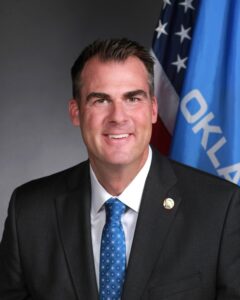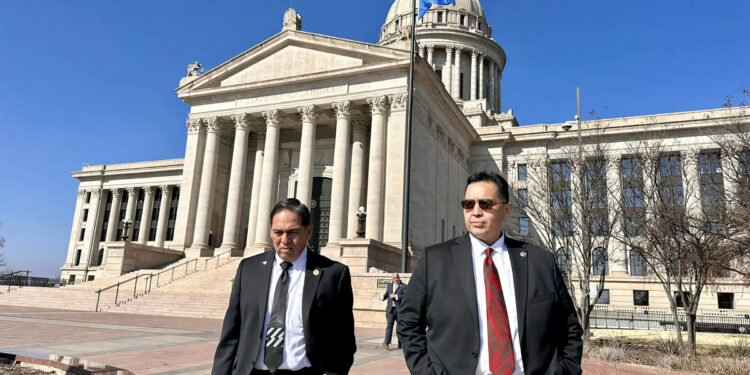“Unfortunately, the Governor’s address today was more of the same. It was full of misleading and false rhetoric, and a fundamental misunderstanding of tribal governments and sovereignty.” – Muscogee (Creek) Nation Principal Chief David Hill
OKLVHOMV CITY, Oklv. – On Monday, Feb. 5 Oklahoma Governor Kevin Stitt delivered his sixth State of the State Address to the 59th Oklahoma Legislature and invited guests at the state capitol. Muscogee (Creek) Nation leadership and leaders from other Oklahoma tribes were in attendance as well. In his speech, Governor Stitt addressed points on poverty, education and issues pertaining to the state’s relationship with the Oklahoma tribes.
The governor was not shy in voicing his frustrations with the landmark McGirt decision, the U.S. Supreme Court case that upheld MCN’s sovereignty to prosecute Native Americans who have committed crimes on the reservation. This year marks the fourth year since the decision was handed down in 2020. Governor Stitt argued it was a decision that was not in the best interests of all state residents.
“Many Oklahomans I talk to want clarity about who has authority to do what in our state. That’s because today, our state is still dealing with the fallout from the McGirt decision. It’s a decision that has rocked our state and caused division where previously there was none.” Governor Stitt said.
Although Stitt has seen strife among relations with the Five Civilized Tribes, the state has recently negotiated compacts with other Oklahoma tribes including Apache, Citizen Potawatomi, and Wyandotte.
Governor Stitt referred to a question he asked in his first State of the State address in regard to whether Native Americans living in Oklahoma were required to pay state income tax. After which, the governor then referred to the Stroble v. Oklahoma, and Hooper v. Tulsa lawsuits.
The former suit is currently in litigation and involves Alicia Stroble, a Mvskoke citizen who is suing for income tax exemption because she is a tribal citizen, living within their jurisdiction and working for their tribe’s government. The latter suit involves Choctaw citizen Justin Hooper, a man who was ticketed by Tulsa police for a traffic infraction even though he is a tribal citizen who committed a crime within MCN’s tribal jurisdiction.
Although Governor Stitt voiced his displeasure over the Stroble case, he had stated earlier in his address that he envisioned eliminating the state income tax for all citizens. According to Stitt, eliminating the state income tax would be necessary in his opinion in order to be competitive in attracting outside business and new residents.

“When I stop to think about Oklahoma in 20 years, here’s what I see: I see people from all over the country moving here so they can keep more of their hard earned money thanks to our 0% income tax.” Governor Stitt said.
Regarding law enforcement, Governor Stitt referred to his newly formed One Oklahoma Task Force, an initiative designed to address cross deputization and jail agreements with tribal law enforcement agencies. This task force was notably opposed by the Inter-Tribal Council of the Five Civilized Tribes. The formation of the task force originally stemmed from an incident involving Okmulgee Jail officials and MCN Lighthorse Police.
Governor Stitt’s argument that all Native Americans in the state must pay state income taxes was precipitated by how the Navajo (Diné) Nation does not build state government-funded roads, schools or hospitals within their jurisdiction. However Governor Stitt did not denote the differences in their status as a protected reservation, or how it is located in more than one lone state.
MCN Principal Chief David Hill responded to the points regarding tribal jurisdiction and the One Oklahoma Task Force made in Governor Stitt’s speech. In Chief Hill’s statement he replied,
“Governor Stitt once again demonstrated that honesty is not his strongest trait. McGirt has not caused confusion, but political games by politicians like Stitt have. The law is clear, but rather than work together to integrate tribal jurisdictions to improve public safety, he has sought to reject it and sowed division. The Governor’s task force is designed to undermine tribal jurisdiction and result in fewer police, fewer courts and fewer prosecutors to keep our communities safe. If the Governor wants to work with tribes, we stand ready. But we will not participate in a political stunt that will make our nations and our state weaker. Unfortunately, the Governor’s address today was more of the same. It was full of misleading and false rhetoric, and a fundamental misunderstanding of tribal governments and sovereignty.”
Governor Stitt is currently in the second year of his final term in office. A decision in the Stroble v. Oklahoma income tax lawsuit has yet to be handed down by the Oklahoma Supreme Court.





